Docx files for personal book: Verbum 9 part 1; Verbum 9 part 2; Verbum 9 part 3; Verbum 9 part 4; Verbum 9 part 5; Verbum 9 part 6; How to use the Verbum Lectionary and Missal; Verbum 8 tips 1-30; Verbum 8 tips 31-49
Reading lists: Catholic Bible Interpretation
Please be generous with your additional details, corrections, suggestions, and other feedback. This is being built in a .docx file for a PBB which will be shared periodically.
Previous post: Aside: Practice searches Next post: Aside: Personal searches
How do I find the word Lord in the New Testament where the Greek is not κύριος?
Search argument: Lord NOTEQUALS lemma:κύριος (selecting match case will omit lord as a verb)
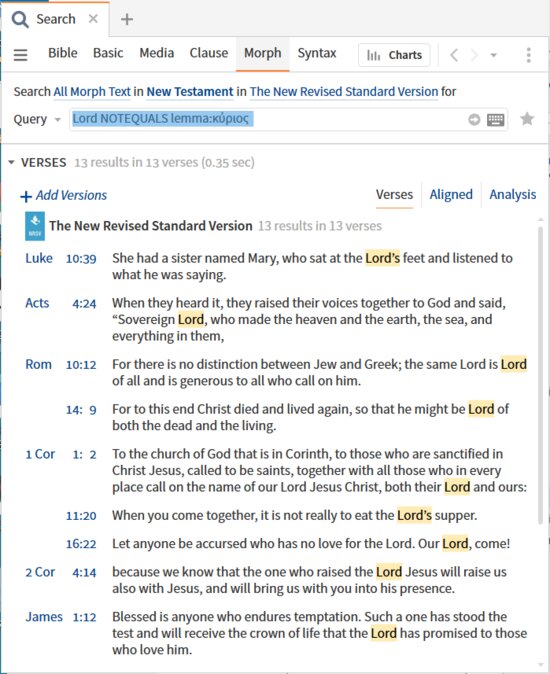
Forum tidbit:
Bradley Grainger (Faithlife) wrote:[quote]
“it's currently a known limitation of the search engine that "INTERSECTS" can't be used as the operand of a proximity operator. We have a case to fix this limitation.[1]”
How do I search for rebuke within 10 words of village?
First, if you want to cross a verse boundary you must use a Basic search as a Bible searches are limited to a single verse.
Second, you need to determine if you are interested in specific words or specific meanings:
Search argument:
- rebuke WITHIN 10 WORDS village
- <Sense to reprove> WITHIN 10 WORDS <Sense village> (note the sense reprove is translated as rebuke – use the interlinear panel to go from translation to sense)
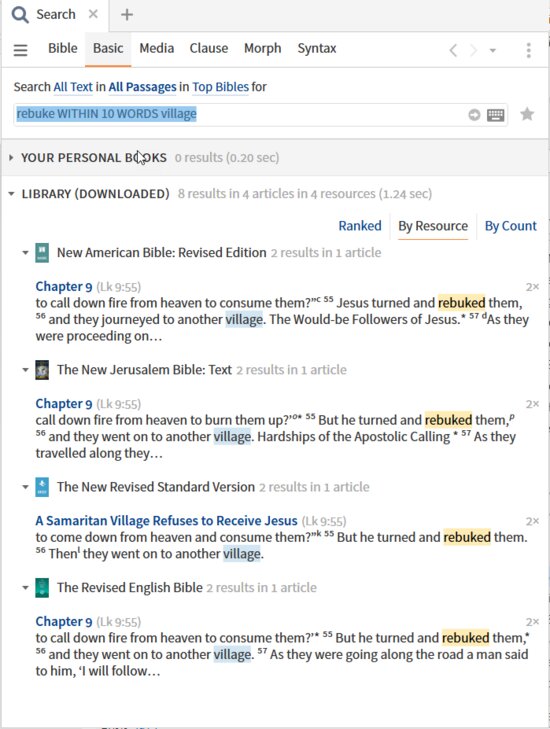
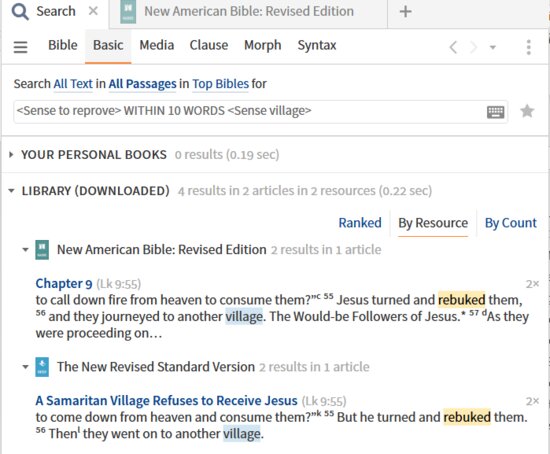
How do I find relative negative constructions (a negator, followed by alla, followed by hina.)?
Stimulus is Michael S. Heiser:[2][quote]
“Jesus answered, ‘It was not’ ”—there is a negative word; the word “not” is a negative. “ ‘It was not that this man sinned, or his parents, but”—that’s the Greek word alla—“but that”—there’s another Greek word there, hina—“but that (all’ hina) the works of God might be displayed in him.”
What we have here in Greek is we have a negative word, a negator, followed by alla, followed by hina. It’s not a very common string of words, and it does have grammatical meaning. There are six of these in John, nine more in the rest of the Greek New Testament. And it’s important because grammarians have taken note of this specific string. They’ve given it a name. They call it the “relative negative.” It’s often used to catch these expressed statements about reality where the first part of the statement, the negated part, is not real. But the next part of the statement is indeed the case. It is indeed the reality."
Assume some manual screening may be necessary
Search arguments:
- · @TN BEFORE 5 WORDS lemma:ἀλλά BEFORE 1 WORDS lemma:ἵνα
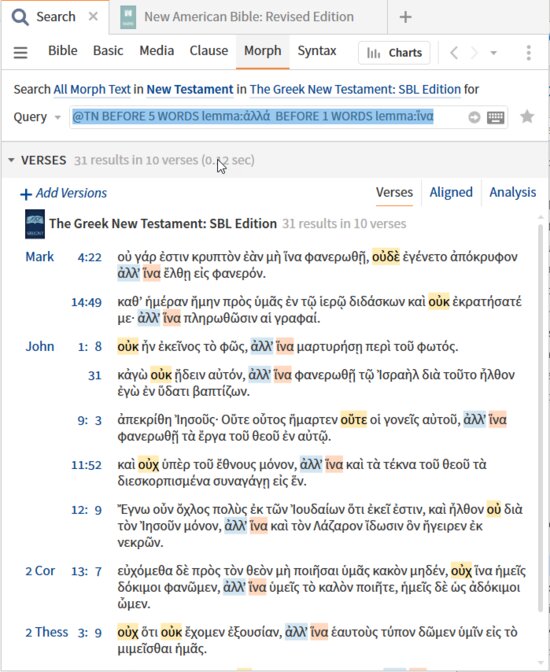
How do I find all the commands of Jesus?
Search arguments:
- {Label Command} INTERSECTS {Speaker <Person Jesus>}
- {Speaker <Person Jesus>} INTERSECTS ({Section <PropositionalOutline = Command>}, {Section <PropositionalOutline = Mandate})
- {Speaker <Person Jesus>} INTERSECTS ({Section <PropositionalOutline Command>}, {Section <PropositionalOutline Command (Neg.)>}, {Section <PropositionalOutline Mandate}, {Section <PropositionalOutline = Mandate (Neg.)>}) (KS4J comprehensive solution – useful for clarifying what you really want).
Andrew Batishko’s discussion of the second option:[3][quote]
{Speaker <Person Jesus>} INTERSECTS ({Section <PropositionalOutline = Command>}, {Section <PropositionalOutline = Mandate})
INTERSECTS instead of AND: The AND operator just looks for places where the left and right side show up in the same verse. The INTERSECTS operator looks for places where the left and the right side occur on the same word. This helps eliminate cases where Jesus says something in a verse, but isn't actually the one saying the command.
Using a comma instead of OR: Putting parentheses around a couple of terms and using commas between them instead of OR turns the items into a list. What this does is make it so that each of the terms in the list show up with the same highlighting instead of different highlighting. This happens because the list is treated as a single term, rather than each item in the OR clause acting as its own separate term.
Adding @V??M on the end: The way that you have this term in your search, makes it operate like (A OR  AND C. This suffers the same problem fixed above with INTERSECTS.
AND C. This suffers the same problem fixed above with INTERSECTS.
So, the search above identifies the commands. If you want to further narrow this down to ones that don't use imperative mood, you would modify the search to something like:
({Speaker <Person Jesus>} INTERSECTS ({Section <PropositionalOutline = Command>}, {Section <PropositionalOutline = Mandate})) NOT INTERSECTS @V??M
This says to take all the commands found with the first search and show all the ones that don't also contain an imperative. You can also make this change to Rick's search if you want to make this identification as well.
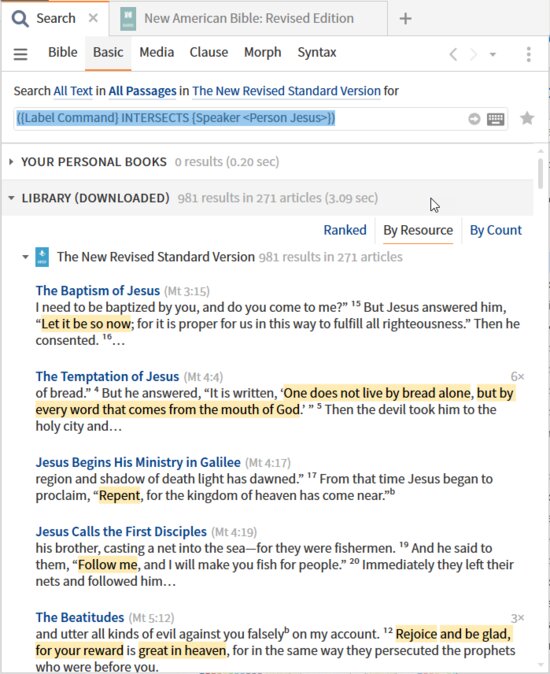
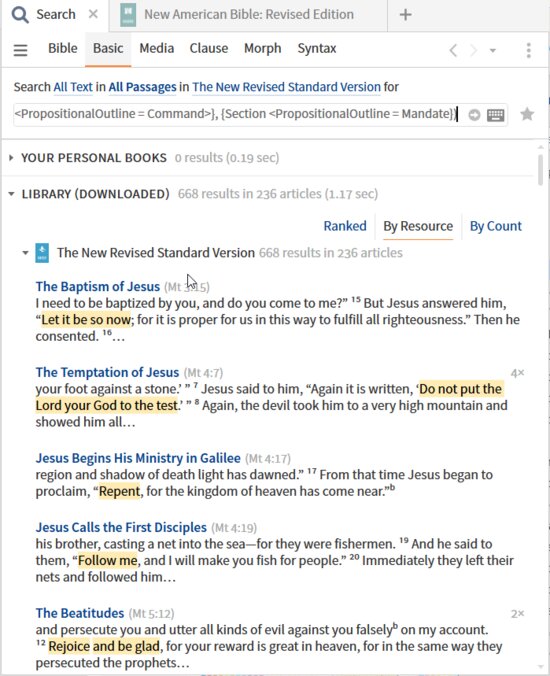
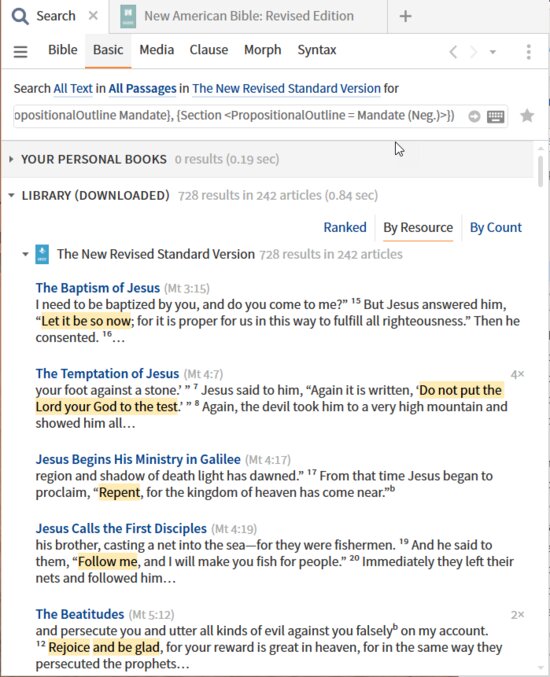
[1] Searching for a Greek word translated in a particular way - Faithlife Forums (logos.com) accessed 6/2/2021 1:32 AM
[2] Michael S. Heiser, BI163 Problems in Bible Interpretation: Difficult Passages III, Logos Mobile Education (Bellingham, WA: Lexham Press, 2019).
[3] Advanced Searching: Finding All the Commands of Jesus - Faithlife Forums (logos.com) accessed 6/2/2021 2:29 AM